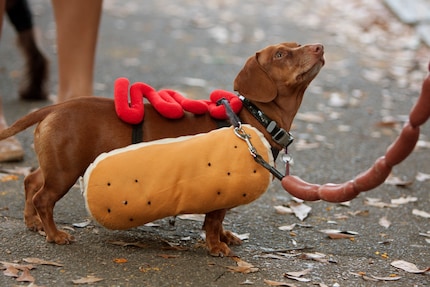
Guide
Paw + Order: do house cats hate being kept indoors?
by Darina Schweizer

People just love to snap pets. Not least because they’re willing to put up with a lot. But there are limits. This is what you have to look out for if you want to take pictures, film or put a furry friend online.
When I’m out and about in the city, I’m always stopping in my tracks. Not because I know that many people (thank God) nor because I’m a huge window shopper (alright, sometimes). It’s just that I’m constantly seeing the cutest dogs. My last crush was a mountain dog tied up outside the supermarket. I was so close to taking a picture of him with my phone. But somehow it didn’t sit right with me.
Is it even allowed to photograph other people’s pets? What about videos? And is it permitted to put videos or pics online? Caroline Mulle, a legal research associate for Swiss animal rights foundation «Stiftung für das Tier im Recht», has the answers.
Caroline Mulle, is it okay to take a photo of someone else’s dog?
Asking first is always a good idea. But yes, legally speaking, you’re allowed to take a picture of any animal. However, you need to make sure the owner’s not recognisable.
Why is that?
Because you might be violating the right to someone’s own image.
But not the right of the animal to its image?
No, animals don’t have (personal) rights under Swiss law.
Does that mean they’re legally considered a thing?
Not any more, no. Having said that, when there are no animal-specific regulations, they are subject to the same regulations as an object.
Are you allowed to put a photo of someone else’s dog or cat on the internet?
As there’s no right to an image of your own property, the publication of an image isn’t punishable as long as no conclusions can be drawn about the animal’s owner.
Does the same apply to video recordings?
Yes.
What else do you need to look out for when snapping a pet?
You should make sure the image doesn’t reveal any identifiable parts of an apartment or background. Otherwise, you risk committing a criminal offence if anything in the photo can be linked to a person. It’s also not permitted to publish images of an animal that’s been accessed illegally. This would be a violation of privacy.
What about if the animal is depicted in a very unflattering way?
The dignity of animals is expressly protected in Switzerland and must therefore always be respected. The protection of dignity is enshrined in both the Swiss Federal Constitution and the Swiss Animal Welfare Act. Accordingly, an animal may not be humiliated or excessively instrumentalised. And its appearance or abilities must not be profoundly affected.

Does that mean I’d be violating an animal’s dignity if I make fun of it in a photo?
Potentially, yes. If this violation isn’t justified by overriding interests, it’s a punishable violation of dignity. It’s considered a form of cruelty to animals, which is punishable with a fine or a prison sentence of up to three years.
What about videos and posts in which animals are dressed up?
Animal cruelty isn’t always immediately recognisable as such in many cute videos you see online. Yet they often go hand in hand with lots of stress for the animal and a disregard for their dignity. This may also be the case if they’re dressed up.
For example?
If the animal’s made to look ridiculous, its freedom of movement’s restricted or the costume causes the animal pain and suffering. Cruel methods are also sometimes applied to make animals do tricks.
What’s the best way of dealing with these kinds of videos?
Don’t like, share or comment. This generates clicks and reach, which could lead to even more videos being produced.
Is liking or sharing a video involving cruelty to animals a criminal offence?
In a recent ruling on a defamation offence, the Federal Supreme Court decided that liking and sharing a person’s post on Facebook constitutes a separate variant of defamation. It’s thereby considerably extended criminal liability in the digital realm. Therefore, applying this rule to the dissemination of depictions of violence by means of likes or shares is conceivable and criminal liability can’t be ruled out. This also applies to videos involving animals.
What do you look out for when you take photos and videos of animals? Have you come across problematic images? I’m looking forward to your comments.
I love anything with four legs or roots - especially my shelter cats Jasper and Joy and my collection of succulents. My favourite things to do are stalking around with police dogs and cat coiffeurs on reportages or letting sensitive stories flourish in garden brockis and Japanese gardens.
Practical solutions for everyday problems with technology, household hacks and much more.
Show all